Wildlife conservation in Southern Africa
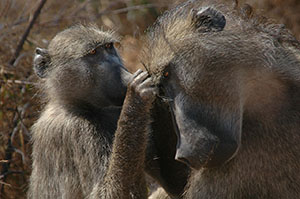 To mark the publication of Nature Conservation in Southern Africa. Morality and marginality : towards sentient conservation? the ASCL Library has compiled a web dossier which focuses on wildlife conservation. The dossier consists of selected titles from the ASCL Library Catalogue, published from 2003, extended with sources available through the UBL Catalogue. Titles link to the corresponding record in the online catalogue, which provides additional details and abstracts, where available. The dossier is introduced by ASCL researcher Harry Wels and concludes with a selection of links to relevant web sites.
To mark the publication of Nature Conservation in Southern Africa. Morality and marginality : towards sentient conservation? the ASCL Library has compiled a web dossier which focuses on wildlife conservation. The dossier consists of selected titles from the ASCL Library Catalogue, published from 2003, extended with sources available through the UBL Catalogue. Titles link to the corresponding record in the online catalogue, which provides additional details and abstracts, where available. The dossier is introduced by ASCL researcher Harry Wels and concludes with a selection of links to relevant web sites.
Introduction | Selected titles | Web resources
Introduction: sentient conservation
 The African Dynamics Series of the African Studies Centre Leiden is a provocative series in African Studies, in which new ideas are explored and conventional wisdoms are often challenged. This edition is no exception to that tradition. In this edited volume a host of scholars from both southern Africa and Europe join hands in taking a refreshing look at (the history of) nature conservation in southern Africa and, on the basis of overwhelming scientific evidence, suggest that we should enter a new phase in nature conservation, SENTIENT CONSERVATION. In the following texts from the introductory chapter the editors explain why the time has come to make this move.
The African Dynamics Series of the African Studies Centre Leiden is a provocative series in African Studies, in which new ideas are explored and conventional wisdoms are often challenged. This edition is no exception to that tradition. In this edited volume a host of scholars from both southern Africa and Europe join hands in taking a refreshing look at (the history of) nature conservation in southern Africa and, on the basis of overwhelming scientific evidence, suggest that we should enter a new phase in nature conservation, SENTIENT CONSERVATION. In the following texts from the introductory chapter the editors explain why the time has come to make this move.
From the introduction (without references and notes): ‘Contemporary southern Africa was established through the extensive and relentless exploitation of both people and animals in the interests of capital, on the basis of a morality that appeared to be divinely sanctioned, and was enforced through brute force of arms. This not only applies to its agricultural and industrial areas, but also to those areas ‘set aside’ for nature. In contemporary southern Africa ‘nature conservation’ proceeds unabated driven by the seemingly natural logic of capitalist profit motive, which is sanctioned by legislation and a dubious and ever shifting moral discourse, and enforced by implacable paramilitary units, often with a shoot to kill policy, that are not answerable to democratic sanction. Nature conservation in southern Africa has at its basis the enforcement of legislation that has consistently privileged the few at the expense of the many – in which the many include animals. Game laws were introduced and enforced in the Cape at the discretion and enjoyment of a small part of the settler minority. Similarly, in the polities that developed out of the Cape and eventually southern Africa as a whole, it was the interests of a small minority that determined what animals and what territories would be ‘preserved’, and which would not; which people would be permitted to hunt and cull; and which human- animals and animals would have to move or be resettled. In this, the central role accorded to men who served in or had served in formal military employment is truly striking. Nature conservation in southern Africa is a phenomena which is characterised by an interplay between Capital, understandings of Morality, and forms of Militarism, that are all dependent upon the shared subservience and marginalization of animals and certain groups of people in society. Although the subjectivity of people is commonly made in the more general histories of conservation in southern Africa, the subjectivity of animals is hardly ever seriously considered or explicitly dealt with. Amongst others, it is Gay Bradshaw who explicitly speaks of the ‘historical trauma’ that is experienced, shared, and intergenerationally transferred by both persecuted, brutalised, and marginalised humans and sentient nonhuman animals. In an example bringing together the fate of American Indians and grizzly bears, she writes: ‘The experiences of the grizzly are not much different than those of their human tribal counterparts, American Indians, who have been subjected to what Maria Yellow Horse Braveheart terms historical trauma – that is “the cumulative emotional and psychological wounding over the lifespan and across generations, emanating from massive group trauma experiences.” ’ The devastating fire in the Grenfell Tower in London in June 2017 in which an estimated 80 people died as a result of poor fire safety standards could similarly be linked to the fire in a mega pig sty in Erichem, the Netherlands, in which in July 2017, 24,000 pigs died, also because of a lack of fire safety standards, like sufficient fire escapes, use of fire resistant materials, etc. Insurance issues seem to dominate the aftermath of both fire tragedies, similar to the times when slaves were just considered to be cargo that could be manipulated and used to secure insurance money. This edited volume seeks to embed its chapters explicitly in the context of these considerations, focusing on processes of marginalization.
(…)
Much has been written on animal conservation in southern Africa, yet nothing so far that has sought to place the animals that are being written about and dealt with in the discussion at the centre of the analysis, that is, as sentient beings with feeling, emotion, and empathy. Still, central to the academic and popular dialogue surrounding conservation in southern Africa is a discourse of morality. The ‘conservation’ of animals is presented in popular culture as a sacred quest to ‘protect’ and ‘preserve’ the natural history of the sub- continent. Within this discourse, hunting is good it is argued, as it protects the stock and thins out the weak and so forth. Given the, by now, overwhelming scientific evidence that people differ from animals in degree and not in kind, it might be an appropriate moment to herald a new phase in wildlife conservation in southern Africa. After a phase of preservation during colonial times, followed by a phase of fortress conservation, followed by a phase of community- based conservation, and now, given the scientific evidence that has broken down the species divide between humans and animals, we are now entering the phase of sentient conservation, a label recognizing, following, and translating the discourse of the Cambridge Declaration. It is a label in which the morality to include all sentient beings, and the marginality of both human and nonhuman in wildlife conservation come together. It is not about prioritising the non- human above humans. It is about recognising the marginality of both local communities and animals and trying to do something about them in equal terms, making the marginality of both the local community and the animal the centre of attention in ‘sentient conservation’ through acknowledging sentience across species boundaries as well as a morality that equally applies to both human and non-human animal.’
Selected titles
Animal studies
Animal studies in general
African studies 'goes animal' / Harry Wels.
The ASCL Africanist Blog, 9 April 2018.
Animal history / Ewa Domańska.
In: History and Theory, vol. 56, no. 2, p. 267-287, 2017.
Animals and anthropology / by Laura Murray. - [Place not identified]: American Anthropological Association, 2017.
https://culanth.org/fieldsights/1119-animals-and-anthropology
Anthrozoology : an important subfield in anthropology / Samantha Hurn.
In: Interdisziplinäre Anthropologie : Jahrbuch 2/2014 : Gewalt und Aggression , p. 179-188.
What was It like to be a cow? : history and animal studies / Erica Fudge.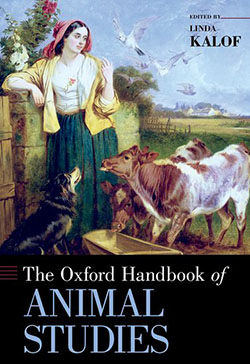
In: The Oxford handbook of animal studies / edited by Linda Kalof, 2014.
Does history need animals? . - Oxford: Blackwell, 2013.
(History and theory, vol. 52, no. 4)
Humans and other animals cross-cultural perspectives on human-animal interactions / Samantha Hurn. - London : Pluto Press, 2012.
What's in a name? Anthrozoology, human-animal studies, animal studies or…? / Samantha Hurn.
In: Anthropology Today, vol. 26, no. 3, p. 27-28, 2010.
Animal studies in Southern Africa
Equids in Mozambican history: the role of zebras, donkeys, horses, and their hybrids / William G. Clarence-Smith.
In: Africana studia : revista internacional de estudos africanos, n. 27, p. 111-126, 2018.
Human conflict over wildlife: exploring social constructions of African wild dogs (Lycaon pictus) in Botswana / Valli-Laurente Fraser-Celin, Alice J Hovorka & Jennifer J Silver.
In: Human dimensions of wildlife, p. 1-18, 2018.
Fruit trees and black bags : temptations for baboons in Eden? / Ryan Kaye and Chloe Guerbois.- [George] : [Nelson Mandela University], 2017.
http://sru.mandela.ac.za/sru/media/Store/images/Study-focuses-on-human-b...
Living with urban baboons : exploring attitudes and their implications for local baboon conservation and management in Knysna, South Africa / Joselyn E. Mormile & Catherine M. Hill.
In: Human dimensions of wildlife, vol. 22, no. 2, p. 99-109, 2017.
Animals' role in proper behaviour: Cheŵa women's instructions in South-Central Africa / Leslie Zubieta.
In: Special theme : Conservation, symbolism and imagination : human-nature interactions in the Global South / Alex Aisher and Vinita Damodaran, p. 406-415, 2016.
Running with rhinos : stories from a radical conservationist / Ed Warner. - Austin, TX: Greenleaf Book Group Press, 2016.
Special issue: Writing animals into African history / edited by Sandra Swart. - London [etc.]: Informaworld [Host], 2016.
Baboon cosmopolitanism : more-than-human moralities in a multispecies community / Samantha Hurn.
In: Cosmopolitan animals , p. 152-166, 2015.
Attitudes of rural communities toward dispersing African wild dogs in South Africa / Daniel M. Parker and others.
In: Human dimensions of wildlife, vol. 19, no. 6, p. 512-522, 2014.
Sotho-Tswana mythic animals : stratagem for environmental conservation / Maserole Christina Kgari-Masondo.
In: New contree : a journal of historical and human sciences for Southern Africa, no. 71, p. 114-135, 2014.
"Blurred lines" : how different views on baboon agency shape the conservation policy making dialogue in Cape Town, South Africa / Kelly Koutstaal. - Leiden: African Studies Centre, 2013.
http://hdl.handle.net/1887/22380
Perceived efficacy of livestock-guarding dogs in South Africa : implications for cheetah conservation / Nicola A. Rust and others.
In: Wildlife Society Bulletin, vol. 37, no. 4, p. 690-697, 2013.
Why Namibian farmers are satisfied with the performance of their livestock guarding dogs / Gail C. Potgieter and others.
In: Human dimensions of wildlife, vol. 18, no .6, p. 403-415, 2013.
Monkey management: using spatial ecology to understand the extent and severity of human–baboon conflict in the Cape Peninsula, South Africa / T.S. Hoffman and M. Justin O'Riain.
In: Ecology and Society, 17(3): 13, 2012.
http://dx.doi.org/10.5751/ES-04882-170313
'Like herding cats!' : managing conflict over wildlife heritage on South Africa’s Cape Peninsula / Samantha Hurn. - Athens, Ga: University of Georgia, Dept. of Anthropology, 2011.
Riding high : horses, humans and history in South Africa / Sandra Swart. - Johannesburg: Wits University Press, 2010.
“The World the Horses Made”: A South African Case Study of Writing Animals into Social History / Sandra Swart.
In: International review of social history, vol. 55, no. 2, p. 241-263, 2010.
Canis Africanis : a dog history of Southern Africa / ed. by Lance van Sittert and Sandra Swart. - Leiden [etc.]: Brill, 2008.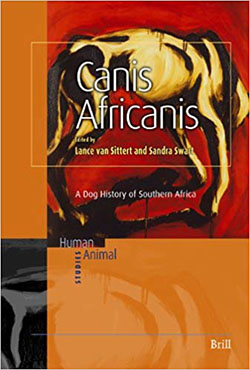
Transspecies urban theory : chickens in an African city / Alice Hovorka. - [Mannheim]: Social Science Open Access Repository, 2008.
http://nbn-resolving.de/urn:nbn:de:0168-ssoar-231877
Human attitudes to primates : perceptions of pests, conflict and consequences for primate conservation / Phyllis C. Lee and Nancy E.C. Priston. - ([Winniepeg, Manitoba] : [Hignell Printing], 2005.
http://citeseerx.ist.psu.edu/viewdoc/download?doi=10.1.1.461.4509&rep=rep1&type=pdf
Fido: Dog tales of colonialism in Namibia / Robert J. Gordon.
In: Social history & African environments / ed. by William Beinart & JoAnn McGregor, p. 173-192, 2003.
Wildlife conservation
Effects of the safari hunting tourism ban on rural livelihoods and wildlife conservation in Northern Botswana / Joseph E. Mbaiwa.
In: South African Geographical Journal, vol. 100, no. 1, p. 41-61, 2018.
The Role of Property Rights in the Relationship between Capital Flows and Economic Growth in SSA: Do Natural Resources Endowment and Country Income Level Matter? / Sionfou Seydou Coulibaly and others
In: African Development Review, vol. 20, no. 1, p. 112-130, 2018.
https://onlinelibrary.wiley.com/doi/abs/10.1111/1467-8268.12316
Understanding South African private landowner decisions to manage rhinoceroses / Elena C. Rubino & Elizabeth F. Pienaar.
In: Human dimensions of wildlife, vol. 23, no .2, p. 160-175, 2018.
A bioeconomic analysis of community wildlife conservation in Zimbabwe / Herbert Ntuli, Edwin Muchapondwa.
In: Journal for Nature Conservation, vol. 37, p. 106-121, 2017.
The changing geography of wildlife conservation : perspectives on private game farming in contemporary KwaZulu-Natal Province, South Africa / Tariro Kamuti.
In: New contree : a journal of historical and human sciences for Southern Africa , no. 79 (December 2017), pages 39-64 (2017).
Human–wildlife interactions and environmental dynamics in the Okavango Delta, Botswana / Kayla Yurco and others.
In: Society & Natural Resources, vol. 30, no. 9, p. 1112-1126, 2017.
Interest in participating in integrated wildlife/livestock land uses in a rural area in South Africa / Vutomi Arone Baloi & Petronella Chaminuka.
In: Human dimensions of wildlife, vol. 22, no. 6, p. 493-505, 2017.
Peasant farmer-raptor conflicts around Chembe Bird Sanctuary, Zambia, Central Africa: poultry predation, ethno- biology, land use practices and conservation / VR Nyirenda and others.
In: Animal biodiversity and conservation, vol. 40, no. 1, p. 121-132, 2017.
Resistance against conservation at the South African section of Greater Mapungubwe (trans)frontier / Ndidzulafhi Innocent Sinthumule.
In: Afrika spectrum, vol. 52, no. 2, p. 53-77, 2017.
Socio-economic factors influencing attitudes of landowners towards free-roaming cheetahs / S. Page-Nicholson and others.
In: Afrrican Journal of Wildlife Reasearch, vol. 47, no.2, p. 114-127, 2017.
Wildlife Management and Conservation on Private Land in Namibia: An Ethnographic Account / Ryan Thomas Klataske. - Michigan State University 2017.
La paix par la coopération environnementale, un nouveau modèle de conservation ? : étude des aires transfrontalières en Afrique australe / Nadia Belaidi.
In: Afrique contemporaine : documents d'Afrique noire et de Madagascar, no. 257, p. 129-143, 2016.
Life as a hunt : thresholds of identities and illusions on an African landscape / Stuart A. Marks. - New York: Berghahn, 2016.
The political ecology of human-wildlife conflict: producing wilderness, insecurity, and displacement in the Limpopo National Park / Francis Massé.
In: Conservation and Society, vol. 14, no. 2, p. 100-111, 2016.
The politics of nature and science in Southern Africa / editors Maano Ramutsindela, Giorgio Miescher, Melanie Boehi. - Basel: Basler Afrika Bibliographien, 2016.
Protecting biodiversity, rehabilitating ecosystems, and promoting conservation for development / Christopher J. Warner, Claudia Sobrevila and George C. Ledec.
In: Making it happen : selected case studies of institutional reforms in South Africa / Asad Alam, Renosi Mokate, and Kathrin A. Plangemann, editors, p. 151-164, 2016.
Trophy Hunting, Conservation, and Rural Development in Zimbabwe: Issues, Options, and Implications / Victor K. Muposhi and others.
In: International Journal of Biodiversity, vol. 2016, 2016.
Media framing of financial mechanisms for resolving human–predator conflict in Namibia / Niki A. Rust.
In: Human dimensions of wildlife, vol. 20, no. 5, p. 493-505, 2015.
The role of institutions in community wildlife conservation in Zimbabwe / Herbert Ntuli and Edwin Muchapondwa. - [Gothenburg]: Environment for Development, 2015.
https://www.thecommonsjournal.org/articles/10.18352/ijc.803/
Securing wilderness landscapes in South Africa : Nick Steele, private wildlife conservancies and saving rhinos / by Harry Wels. - Leiden: Brill, 2015.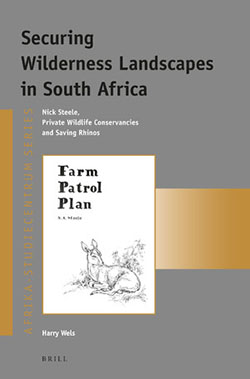
Why are lions killing us? : human-wildlife conflict and social discontent in Mbire District, northern Zimbabwe / Steven Matema and Jens A. Andersson.
In: The journal of modern African studies, vol. 53, no. 1, p. 93-120, 2015.
Conserved spaces, ancestral places : conservation, history and identity among farm labourers in the Sundays River Valley, South Africa / Teresa Connor. - Scottsville: University of KwaZulu-Natal Press, 2014.
Elephants are like our diamonds : recentralizing Community Based Natural Resource Management in Botswana, 1996-2012 / Parakh Hoorn.
In: African studies quarterly : the online journal of African Studies, vol. 15, no. 1, p. 55-70, 2014.
Private game farming and its social consequences in post-apartheid South Africa: contestations over wildlife, property and agrarian futures / Marja Spierenburg and Shirley Brooks.
In: Journal of Contemporary African Studies, vol. 32, no. 2, p. 151-172, 2014.
Special issue : farm dwellers, the forgotten people? Consequences of conversions to private wildlife production in South Africa / [guest ed.: Marja Spierenburg]. - Abingdon: Routledge, Taylor & Francis, 2014.
Spill-over effect in media framing: Representations of wildlife conservation in Zimbabwean and international media, 1989–2010 / Edson Gandiwa [and others].
In: Journal for Nature Conservation, vol. 22, no. 5, p. 413-423, 2014.
The stag of the Eastern Cape : power, status and Kudu Hunting in the Albany and Fort Beaufort Districts, 1890 to 1905 / David Gess and Sandra Swart.
In: African historical review , vol. 46, no. 2, p. 48-76 : foto's, krt., tab, 2014.
A critical review of environmental conservation in Zimbabwe / Munyaradzi Mawere.
In: Afrika spectrum, vol. 48, no. 2, p. 85-97, 2013.
Old land, new practices : the changing face of land and conservation in post-colonial Africa / guest ed.: George Barrett ... [et al.]. - Abingdon: Routledge, Taylor & Francis, 2013.
CBNRM in Botswana : the failure of CBNRM for the indigenous San, the village of Xai Xai and the wildlife of Botswana / by Kerri-Anne Garner. - Guelph: University of Guelph, 2012.
http://hdl.handle.net/10214/4053
‘God is my forest’ – Xhosa cultural values provide untapped opportunities for conservation / Susi Vetter [and others].
In: South African Journal of Science, vol. 108, no. 5/6, 2012.
Indigenous knowledge in the management of a community-based forest reserve in the Wa West District of Ghana / Abdul-Kadiri Yahaya.
In: Ghana journal of development studies , vol. 9, no. 1, p. 121-137 : graf., tab, 2012.
A media analysis of wildlife conservation in Zimbabwe / by Sylvie Sprangers. - [S.l.: s.n.], 2012.
http://www.asclibrary.nl/docs/352719966.pdf
Whose elephants? : conserving, compensating, and competing in Northern Botswana / Rachel DeMotts & Parakh Hoon.
In: Society & Natural Resources, vol. 25., no. 9, p. 837-851, 2012.
Wildlife Conservation in Zambia: Impacts on Rural Household Welfare / Robert B. Richardson.
In: World Development, vol. 40, no. 5, p. 1068-1081, 2012.
Agricultural intensification : saving space for wildlife? / Frédéric Baudron. - [S.l.: s.n.], 2011.
https://edepot.wur.nl/176819
The impact of land reform in Zimbabwe on the conservation of cheetahs and other large carnivores / Samual Williams. - Durham: Durham University, 2011.
http://etheses.dur.ac.uk/3410/
New alliances for tourism, conservation and development in Eastern and Southern Africa / ed. by René van der Duim ... [et al.]. - Delft: Eburon, 2011.
Preliminary Assessment of Illegal Hunting by Communities Adjacent to the Northern Gonarezhou National Park, Zimbabwe / Edson Gandiwa.
In: Tropical Conservation Science, vol. 4, no. 4, p. 445-467, 2011.
Exploring prospects for enhancing community participation in protected area management : a case study of the Moremi Game Reserve Area / Dimpho L. Sebotho and Elisha N. Toteng.
In: Botswana notes and records, vol. 42, p. 100-111, 2010.
From hope to crisis and back again? A critical history of the global CBNRM narrative / Wolfram Dressler and others.
In: Environmental conservation, vol. 37, no. 1, p. 5-15, 2010.
Human–wildlife conflict in Mozambique: a national perspective, with emphasis on wildlife attacks on humans / Kevin M. Dunham and others. 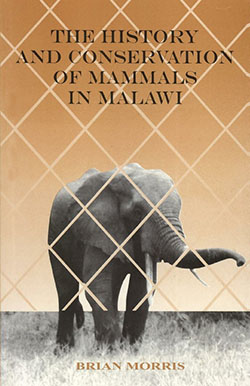
In: Oryx, vol. 44, no. 2, p. 185-193, 2010.
Rural people's perceptions of wildlife conservation : the case of the Masebe Nature Reserve in Limpopo Province, South Africa / Chris Boonzaaier.
In: Anthropology Southern Africa, vol. 22, no. 1/2, p. 55-64, 2010.
Cheetah conservation in South Africa / Kenneth Buk and Kelly Marnewick.
In: Africa insight , vol. 39, no. 4, p. 212-224 : krt, 2009.
Human-wildlife conflict in Africa : causes, consequences and management strategies / F. Lamarque [and others]. - Rome: Food and Agriculture Organization of the United Nations, 2009.
http://www.fao.org/docrep/012/i1048e/i1048e00.pdf
System inertia in the changing paradigm for biodiversity conservation in South Africa / Twahiri Amani Saidi and Marubini Cendra Malivho.
In: Africa insight , vol. 39, no. 4, p. 99-108 : tab, 2009.
Elephant management : a scientific assessment for South Africa / edited by R.J. Scholes and K.G. Mennell. - Johannesburg, South Africa: Wits University Press, 2008.
http://hdl.handle.net/10204/2983
A new call of the wild: community-based natural resource management in Namibia / Karl Boudreaux.
In: Georgetown international environmental law review, vol, 20, no. 2, p. 297-335, 2008.
“Your Elephant on Our Land” : the struggle to manage wildlife mobility on Zambian communal land in the Kavango-Zambezi transfrontier conservation area / Simon Metcalfe, Thembela Kepe.
In: The Journal of Environment & Development, vol. 17, no.2, p. 99-117, 2008.
A proposed general model for southern African community-based wildlife management / Peter J. Balint.
In: Human dimensions of wildlife, vol. 12, no. 3, p. 169-179, 2007.
The history and conservation of mammals in Malawi / Brian Morris. - Zomba: Kachere Series, 2006.
African dreams of cohesion: elite pacting and community development in transfrontier conservation areas in southern Africa / Malcolm Draper, Marja Spierenburg, Harry Wels.
In: Culture and Organization, vol. 10, no. 4, p. 341-353, 2004.
The rise of conservation in South Africa : settlers, livestock, and the environment 1770-1950 / William Beinart. - Oxford [etc.]: Oxford University Press, 2003.
Cultural constructions of the wild : the rhetoric and practice of wildlife conservation in the Cape Colony at the turn of the twentieth century.
In: South African historical journal, vol.47, no.1, p. 75-95, 2002.
Protected areas
Fair game : a hidden history of the Kruger National Park / by David Fleminger. - Johannesburg: DogDog Publishing, 2017.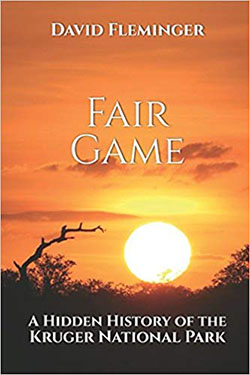
Gamekeepers and counter-insurgency in Kenya and Rhodesia (Zimbabwe), 1952-1980 / by Tim Stapleton.
In: The international journal of African historical studies, vol. 49, no.2, p. 213-234, 2016.
Owners of learning : the Nyae Nyae village schools over twenty-five years / Jennifer Hays. - Basel: Basler Afrika Bibliographien, 2016.
Tracking wildlife conservation in Southern Africa histories of protected areas in Gorongosa and Maputaland / by Kathleen McKeown. - [Minneapolis]: University of Minnesota, 2015.
http://hdl.handle.net/11299/175690
Underperformance of African protected area networks and the case for new conservation models: insights from Zambia / Peter A. Lindsey [and others].
In: PLoS ONE, vol. 9, no. 5, 2014.
Chiefs, hunters and San in the creation of the Moremi Game Reserve, Okavango Delta : multiracial interactions and initiatives, 1956-1979 / Maitseo M.M. Bolaane. - Osaka: National Museum of Ethnology, 2013.
Elephants of democracy : an unfolding process of resettlement in the Limpopo National Park / Jessica Milgroom. - [S.l.: s.n.], 2012.
https://edepot.wur.nl/211228
When a human-elephant conflict causes frames to collide : the case of the Moribane Forest Reserve, Mozambique / Malou Buddiger. - [S.l: s.n.], 2012.
http://www.asclibrary.nl/docs/352843969.pdf
'They promised that the game fences would be torn down' : nationalist politics and contested control of natural resources in southeastern Zimbabwe, 1960s-1970s / by Richard Mtisi.
In: The international journal of African historical studies , vol. 45, no. 3, p. 427-448 : krt, 2012.
Access to benefits from community based tourism : a discursive ethnography of conflict over benefits in Anabeb Conservancy, Namibia / Arjaan Pellis. - [S.l.: s.n.], 2011.
http://www.asclibrary.nl/docs/338904948.pdf
Navigating through a landscape of powers or getting lost on Mount Gorongosa / Carolien Jacobs.
In: Journal of legal pluralism and unofficial law , no. 61, p. 81-108, 2010.
Wildlife conservation in Zambia : impact of Game Management Areas on household welfare / by Ana Fernandez. - 2010.
http://gateway.proquest.com/openurl?url_ver=Z39.88-2004&rft_val_fmt=info:ofi/fmt:kev:mtx:dissertation&res_dat=xri:pqdiss&rft_dat=xri:pqdiss:1485582
Poaching
Predictors of elephant poaching in a wildlife crime hotspot : the Ruvuma landscape of southern Tanzania and northern Mozambique / N. Zafra-Calvo and others.
In: Journal for nature conservation, vol. 41, p. 79-87, 2018.
Realization of poaching effects on rhinoceroses in Kruger National Park, South Africa / Sam M. Ferreira and others.
In: African Journal of Wildlife Research, vol. 48, no. 1, p. 1 - 7, 2018.
A critical analysis of the relationship between the state and wildlife crime : case: rhino poaching in South Africa / by Ida Wæhle Gaustadsæther. - Stellenbosch: Stellenbosch University, 2017.
http://hdl.handle.net/10019.1/100861
Inclusive anti-poaching? : exploring the potential and challenges of community-based anti-poaching / F. Massé and others.
In: South African crime quarterly / no. 60, p. 19-27, 2017.
Green violence : rhino poaching and the war to save Southern Africa's peace parks / Bram Büscher and Maano Ramutsindela. 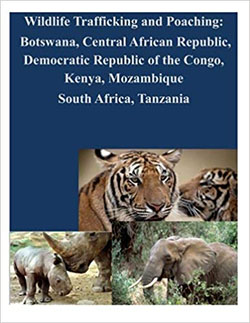
In: African affairs : the journal of the Royal African Society, vol. 115, no. 438, p. 1-22, 2016.
Disruption of rhino demography by poachers may lead to population declines in Kruger National Park, South Africa / Sam M. Ferreira and others.
In: PLoS ONE, vol. 10, no. 6, p. e0127783, 2015.
In the line of fire : elephant and rhino poaching in Africa / Khristopher Carlson, Joanna Wright, and Hannah Dönges.
In: Small arms survey 2015 : weapons and the world / Small Arms Survey, p. 6-35.
Local perceptions of risk associated with poaching of wildlife implicated in human-wildlife conflicts in Namibia / Jessica S. Kahler and Meredith L. Gore
In: Biological Conservation, vol. 189, p. 49, 2015.
Evaluating wire-snare poaching trends and the impacts of by-catch on elephants and large carnivores / Matthew Becker and others.
In: Biological conservation, vol. 158, p. 26-36, 2013.
Poaching Risks in Community-Based Natural Resource Management / Jessica S. Kahler, Gary J. Roloff, and Meredith L. Gore.
In: Conservation biology, vol. 27, no. 1, p. 177-186, 2013.
Wildlife trafficking and poaching : Botswana, Central African Republic, Democratic Republic of the Congo, Kenya, Mozambique, South Africa, Tanzania. - [Washington, D.C.]: The Law Library of Congress, Global Legal Research Center, 2013.
http://www.loc.gov/law/help/wildlife-poaching/trafficking-and-poaching.pdf http://www.heinonline.org/HOL/Page?handle=hein.intyb/wldtrfc0001&id=1&size=2&collection=intyb&index=intyb/wldtrfc
Law enforcement
Tackling illegal wildlife trade in Africa : economic incentives and approaches / Christopher Vandome and Alex Vines. - London: Chatham House, 2018.
ASC Subject·Headings: Southern Africa ; Sadc ; wildlife protection ; illicit trade ; poaching ; ecotourism ; national parks and reserves ; environmental economics
https://www.chathamhouse.org/sites/default/files/publications/2018-10-11-VandomeVines-Illegal-wildlife-WEB.pdf
International wildlife law : understanding and enhancing its role in conservation / Arie Trouwborst and others.
In: BioScience, volume 67, nummer 9, pages 784-790, 2017.
https://doi.org/10.1093/biosci/bix086
Prosecution of Rhino Poachers: The Need to Focus on Prosecution of the Higher Echelons of Organised Crime Networks / Robert Doya Nanima.
In: African Journal of Legal Studies, vol. 9, no. 4, p. 234, 2016.
Special Issue : environmental crime in Sub-Saharan Africa : a review and future challenges / Derica Lambrechts [ed.]. - Abingdon [etc.]: Routledge [etc.], 2016.
Wildlife law enforcement in Sub-Saharan African protected areas : a review of best practices / David W. Henson, Robert C. Malpas and Floris A.C. D’Udine. - Gland, Switzerland: Iucn, 2016.
https://portals.iucn.org/library/sites/library/files/documents/SSC-OP-058.pdf
Global impacts of the illegal wildlife trade : the costs of crime, insecurity and institutional erosion / Katherine Lawson and Alex Vines. - London: Chatham House, 2014.
https://www.chathamhouse.org/sites/default/files/public/Research/Africa/...
Illegal hunting and law enforcement during a period of economic decline in Zimbabwe: A case study of northern Gonarezhou National Park and adjacent areas / E. Gandiwa and others.
In: Journal for Nature Conservation, vol. 21, no.3, p. 133-142, 2013.
Wildlife legislation in Sub-Saharan Africa : criminal offences / Gareth Mauck. - Place of publication unknown: [Conservation Action Trust], 2013.
Environmental laws of Namibia: constitutions, conservation, and cheetahs / Stephen W. Snively.
In: Probate & Property, vol. 26, no. 3, p. 44, 2012.
Status quo of compliance monitoring and enforcement of biodiversity and conservation legislation in South Africa / Endangered Wildlife Trust. - Johannesburg : Endangered Wildlife Trust, 2012.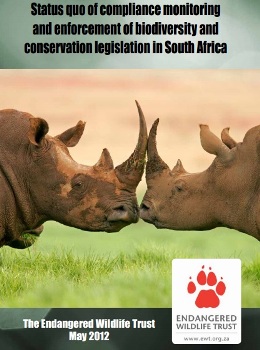
The South Africa – Vietnam rhino horn trade nexus: a deadly combination of institutional lapses, corrupt wildlife industry professionals and Asian crime syndicates / by Tom Milliken and Jo Shaw with contrib. from Richard H. Emslie ... [et al.]. - Johannesburg: TRAFFIC International, 2012.
https://www.traffic.org/site/assets/files/2662/south_africa_vietnam_rhino_horn_nexus.pdf
Wildlife law in the Southern African Development Community / Elisa Morgera. - Budakesz : CIC, 2010
http://www.fao.org/3/a-ap537e.pdf
A critique of the legal framework for wildlife protection in Malawi / Justin Kalima.
In: Malawi law journal, vol. 3, no. 2, p. 275-235, 2009.
Animal rights in South Africa / Michelè Pickover. - Cape Town: Double Storey, 2005.
Selected web resources
The ASCL is not responsible for the content of external internet sites
Animals & Society Institute
Website of the Animals & Society Institute including documents, materials and links related to human-animal studies (HAS).
https://www.animalsandsociety.org/
Defining Human-Animal Studies: An ASI Video Project
Scholars define, in 3-minute long videos, terms that are used within their realm of human-animal studies.
https://www.animalsandsociety.org/human-animal-studies/defining-human-animal-studies-an-asi-video-project/
IUCN, International Union for Conservation of Nature
Website of the IUCN, an international organization working in the field of nature conservation and sustainable use of natural resources.
https://www.iucn.org/
Panthera
Website of Panthera, an organization that is devoted exclusively to the conservation of the world's 40 wild cat species and their landscapes. Its science center includes publications that Panthera scientists have produced.
https://www.panthera.org/ (Homepage)
https://www.panthera.org/science-center (Science Center)
Resource list on human-animal interactions
compiled by the Library of the University of Exeter
https://rl.talis.com/3/exeter/lists/0B4BD18A-BC02-51D5-E7EF-42A135EBD212.html?lang=nl-NL
Wildlife Conservation Society (WCS) Library & Archives
WCS Library & Archives public website including articles, books, reports, and data WCS staff have produced.
https://library.wcs.org/
World Wildlife Fund (WWF)
Website of the WWF including a section on WWF publications on wildlife condervation.
https://www.worldwildlife.org/ (Homepage)
https://www.worldwildlife.org/publications?initiative_id=wildlife-conservation (Publications on wildlife conservation)

